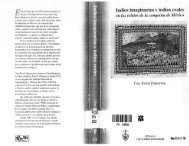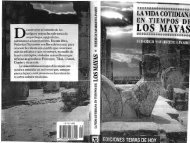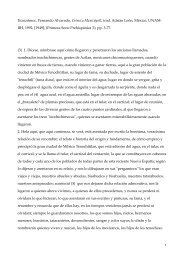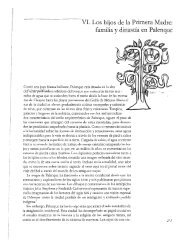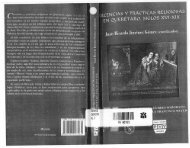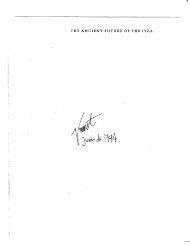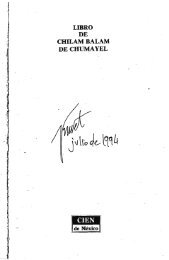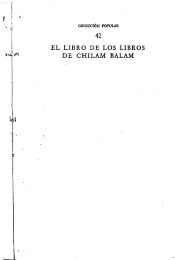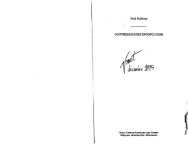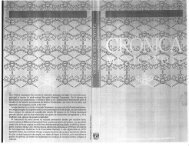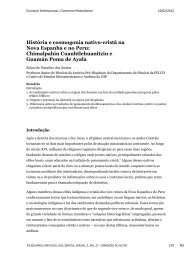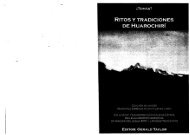HEAVEN BORN MERIDA AND ITS DESTINY - Histomesoamericana
HEAVEN BORN MERIDA AND ITS DESTINY - Histomesoamericana
HEAVEN BORN MERIDA AND ITS DESTINY - Histomesoamericana
Create successful ePaper yourself
Turn your PDF publications into a flip-book with our unique Google optimized e-Paper software.
26 INTRODUCTION<br />
his regalia—his mask, robe, staff, crown, fan, cask, cup, bowl, plate, burden,<br />
and probably other paraphernalia as well—and the new Jaguar is<br />
seated, suitably accoutred, on his mat and throne. (The throne must certainly<br />
have been a stone bench, and the mat on it was a necessity for comfort.<br />
Quiche lords got pillows, too.) Presumably the Jaguar's Spokesman<br />
was similarly invested, but nowhere is there any indication of how he was<br />
dressed or equipped.<br />
Act 10. Yearbearer Seating. Since this ceremony was held in 1618, the<br />
senior yearbearer was 11 Kan, here identified with the Red Noble. The<br />
East and North priests were "leaders of the foot"; those of the west and<br />
south were "leaders of the hand," a detail not mentioned elsewhere. The<br />
yearbearer-seating ceremony is said to "establish the town," and presumably<br />
everybody else could now sit down, but in the strictest order of rank.<br />
Act 11. Pacing. The 7 Pacers [uuc taz cab) now parade, theirsurveying<br />
stick [p'iz te) borne on the back of the alligator god. The pacers are elsewhere<br />
identified as the Surveyor [ah p'iz te), the Marker [ah lub te), the<br />
Scrubber [ah xuk, who was the Jaguar himself), the Sweeper [ah miz),<br />
the Remover [cit ahau), the Wakener [ahel cab), and the Renewer ( tumte<br />
ahau). At the end of a katun, all titles to lands and offices weie canceled<br />
and renewed. This is the ceremony that did it. The ex officio participation<br />
of the Jaguar is thus highly significant. The alligator god, who has the<br />
power to destroy the world by earthquakes, demonstrated his beneficence<br />
by bringing light, in what must have been an impressive candlelight procession.<br />
(Yucatan is outside the earthquake zone in any case.)<br />
Act 12. Dawn. The 9 Gods sacrifice the 7 Pacers and count (and rank)<br />
the mats. This had the same significance for titles to office that the preceding<br />
act had for titles to land. What was involved was an initial (ceremonial)<br />
lineup of the candidates for investiture for the coming katun,<br />
subject to their satisfactory (ceremonial) demonstration of legitimacy in<br />
act 14. No wonder this taxing job was delegated to the impersonators of<br />
the gods of the underworld. No wonder either that haggling and trading<br />
and envy were involved.<br />
Act 13. Sacrifice. The 4 Yearbearers reappear, this time in the guise of<br />
the four death gods. Some (symbolic?) sacrifice was doubtless made, but it<br />
is discreetly omitted from the text. Human sacrifice was still going on in<br />
Yucatan at this date, but in Merida!?<br />
Act 14. Examination. The examination ceremony was always accompanied<br />
by a feast. Chapters 30 and 31 provide a pony for the questions and<br />
answers expected in "The Language of.Zuyua." Itza or Xiu, every aspirant<br />
to nobility had to know the right answers, whatever scandal may have<br />
surrounded his birth. The ritual riddles largely concern the feast—and<br />
one may well imagine that it was usually memorable, even apart from<br />
the spice added by the examination, which must in any case have been<br />
largely pro forma.<br />
Act 15. The Word. This is also referred to as the news [mut] of the<br />
katun. The 9 Gods announce the fate of the katun, phrased as a matter<br />
of its food. As usual, the news in this case was bad.<br />
!«-<br />
A



